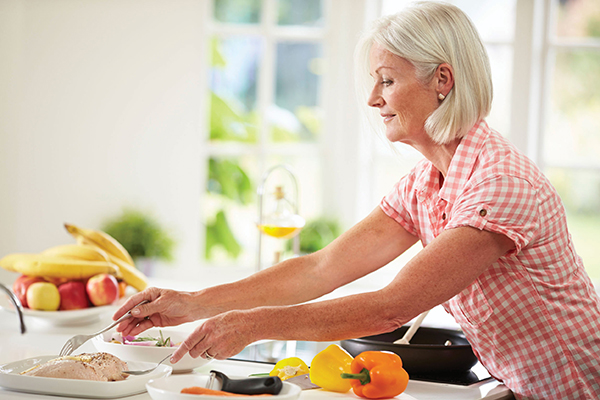Smart Food Choices for Cancer Survivors
by Julie Lanford, MPH, RD, CSO, LDN
Having cancer can change how you see the world. You want to make the most of each day, you are more grateful for family and friends, and you ask yourself, “What can I do to be healthy during and after treatment?”
A healthy lifestyle can improve your quality of life and optimize survivorship. The foods you choose to eat, or are able to eat, are key parts of your lifestyle. Making smart food choices can help keep you strong during treatment, reduce the risk of your cancer coming back, and lower your risk of other diseases.
The Relationship between Cancer & Nutrition
There are no guarantees when it comes to nutrition and cancer, but research shows that choosing healthy foods and being active can put the odds in our favor. Eating a variety of fruits, vegetables, whole grains, beans, and nuts means that you are getting antioxidants, vitamins, minerals, and phytochemicals (plant nutrients) that your body needs each day.
The nutrients you get from food can help ease cancer-related side effects, reduce cell damage, boost your immune system, and generally keep your body healthy. As much as possible, you should get your nutrients from food, not from pills. That’s how our bodies prefer it.
Try These Delicious Ways to Add More Plant Proteins to Your Diet
- Mix peanut butter into oatmeal, or spread it on an apple, a banana, or whole wheat crackers.
- Throw beans into chili, soups, and salads.
- Go for a black bean burger instead of one made from beef.
- Cook up an easy vegetable stir fry with quinoa and edamame.
- Have nuts as a snack, in a salad, in yogurt, or on cereal.
Nutrition Challenges during Treatment
Many people experience eating challenges at some point during treatment. However, it’s important to get adequate nutrition, even when facing these types of challenges. Good nutrition during treatment can help
- regulate your weight and preserve your energy
- protect your nutrient levels
- lessen cancer-related side effects
- improve your quality of life
- support your immune system

Eating the MyPlate way means filling half your plate with vegetables and fruits and the other half with lean protein and grains, as well as incorporating some type of dairy into your diet.
Visit ChooseMyPlate.gov to learn more.
Most important is to make sure you get enough calories and protein to support your body’s needs. Weight loss and muscle loss are often the first signs of not eating enough. This will often result in feelings of weakness and fatigue.
If weight loss or poor appetite is a concern, focus on eating small high-calorie, high-protein foods every two to three hours. Foods like peanut butter, nuts or seeds, beans, smoothies, cheese, yogurt, and whole grains can give you calories and protein, in addition to other nutrients.
A Healthy Diet
If you are not having difficulty with weight loss or poor appetite, this is the perfect time to make nutritious changes to your diet. Across the board, a plant-based diet is the clear recommendation for cancer survivors. However, many people aren’t sure what plant-based eating really means.
Plant-based eating simply means that at least two-thirds of your plate is covered with plant foods. Yes, you can still eat meat if you want! But even if you choose to include meat in your diet, you will still want to eat plant proteins each day. (See sidebar for tips on incorporating plant proteins into your diet.)
If you use the USDA My Plate, the AICR New American Plate, or the Harvard Healthy Eating Plate (all available online) as a guide, you will notice they all have a focus on fruits, vegetables, whole grains, beans, and nuts. While you don’t have to become vegetarian to improve your diet, eating plenty of plant foods and only a small amount of animal foods is a healthy pattern that that will help give your body energy and protect against disease.
Your Take-Home Message
Sometimes all the nutrition advice being passed around can seem overwhelming. Try to focus on the things we know for sure will help you stay strong during cancer treatment and heal quickly afterwards. Each day, choose
- 4-5 cups of fruits and vegetables
- 100% whole grains
- 30-45 grams of fiber
- 1 or more servings of plant protein (such as beans, nuts, and seeds)
- Spices and herbs, instead of salt and sugar, to flavor food
- Water, unsweetened tea, and coffee to stay hydrated
And remember what mom always said: Eat your vegetables!
 Julie Lanford is a registered dietitian and the wellness director for Cancer Services, Inc., a nonprofit support agency in Winston-Salem, NC. She has been working with people facing cancer for over 10 years. Her survivor-inspired blog can be found at CancerDietitian.com. You can also connect with Julie on Facebook, Twitter, Pinterest, Instagram, and YouTube.
Julie Lanford is a registered dietitian and the wellness director for Cancer Services, Inc., a nonprofit support agency in Winston-Salem, NC. She has been working with people facing cancer for over 10 years. Her survivor-inspired blog can be found at CancerDietitian.com. You can also connect with Julie on Facebook, Twitter, Pinterest, Instagram, and YouTube.
This article was published in Coping® with Cancer magazine, September/October 2019.


